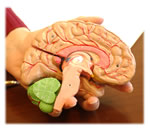What is Neuropsychology?
  Neuropsychology is the study of the relationship between the brain and human
behavior. Neuropsychology is the study of the relationship between the brain and human
behavior.
A neuropsychologist is a licensed
psychologist with specialized training in how brain functions
and systems affect learning, behavior, and development.
Neuropsychological evaluations are frequently recommended
when patients experience problems involving concentration,
thinking or memory. Neuropsychological evaluations are highly
sensitive to subtle cognitive difficulties. They are very
useful in determining which areas of the brain have been
affected by an injury or disease and how it will impact the
patient’s daily life. Neuropsychological evaluations
are also powerful tools in treatment planning and for monitoring
recovery.
Further, some individuals seek neuropsychological evaluations
to obtain a “baseline” of their current level
of functioning and to get a better understanding of themselves
and their unique personality and neurocognitive profile.
Individuals can use this information to make themselves more
effective at work and in their personal relationships, using
their strengths to compensate for weaknesses.
The result of the evaluation is diagnostic clarity and a
treatment plan tailored to the patient’s unique personality
and neurocognitive profile. This information is discussed
at a feedback meeting
and is detailed in a written report. The report includes specific,
individualized recommendations that have been shown to be effective
for similar individuals. Interventions can be implemented in
concert with existing professionals (e.g., educators, psychologists,
physicians) and with referrals and new resources introduced
by the neuropsychologist.
|

